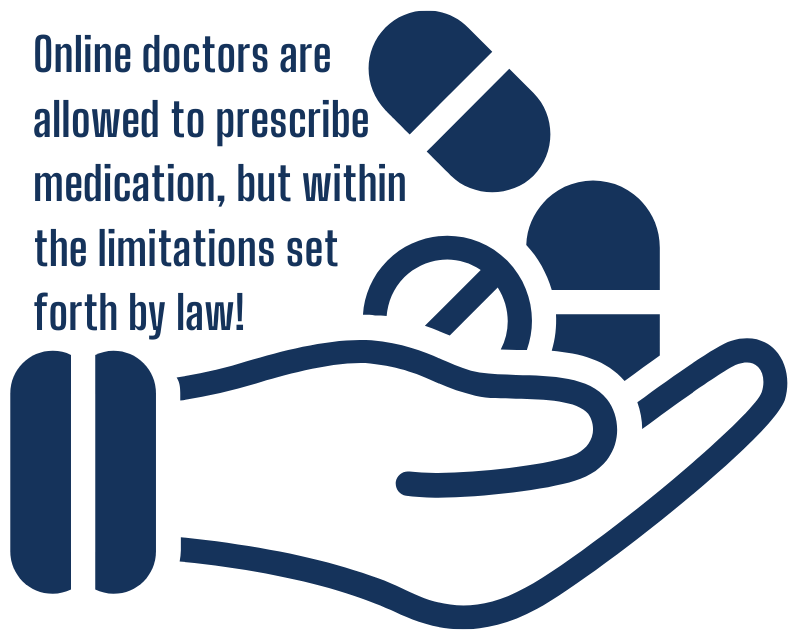Yes, but within the limitations set forth by law.
Generally, online doctors are permitted to prescribe medications and even send electronic ones to pharmacies across the state. They are free to prescribe non-controlled substances to their patients as long as necessary, but they don’t have as much freedom on the use of controlled substances. There must always be a consultation, whether in-office or virtual before any medication is prescribed to the patient. The same is true even for prescription refills. It then depends on your online doctor’s findings if you are suited for a prescription or not.

E-Prescribing
The act of issuing prescriptions through telemedicine is technically referred to as e-prescribing or eRx. The government highly regulates this act as it involves prescriptions of controlled substances. Despite restrictions, the rate of electronic prescription in the United States has increased dramatically in three years, from 2017 to 2019. In the latter year, 80% of all prescriptions issued in the United States were electronic. 86% are prescriptions for non-controlled substances, while 38% are for controlled substances like opioids. The rise can be greatly attributed to telemedicine’s expansion and the convenience it provides. Most electronic prescriptions are sent directly to the patient’s chosen pharmacy, which could prepare the medications for pick-up or delivery.
E-prescribing has brought tremendous changes to prescribing. It has reduced errors in the type of medications and amount of dosage prescribed which can be caused during the traditional physical transmission of prescriptions. It has served as extra security for patients safely taking the proper medication intended by their physicians for them to take. Patients who have drug dependency problems would not modify their doctor’s prescription because of the direct transmission from the physician to the pharmacy.
Schedules of Controlled Substances
However, a doctor’s consultation is not the only requirement to be complied with to be issued a prescription. There are limitations provided by both federal and state law depending on the type of Schedule of the drug or substance being prescribed and the physician’s license. To better understand the laws, we must first educate ourselves on the different schedules of controlled substances:
- Schedule I: Substances under this Schedule are highly susceptible to abuse and have no safety measures accepted even under medical supervision. Heroin, lysergic acid diethylamide (LSD), and ecstasy are included in this Schedule.
- Schedule II/IIN: Opium, morphine, oxycodone, methadone are listed under this Schedule. They can lead to dependence psychologically and physically.
- Schedule III/IIIN: This has a lower potential for abuse than the two previously mentioned schedules and may have a moderate to low effect on an individual’s physical dependence but still high psychological dependence. Some examples are Tylenol with <90 mg Codeine®, anabolic steroids, and benzphetamine.
- Schedule IV: Substances under this category have a low potential for abuse than those in the immediate preceding Schedule. The most known substances falling under this Schedule are Xanax, Valium, lorazepam, Soma, and other similar substances.
- Schedule V: Cough medicines like Robitussin, Codeine and Phenergan, and ezogabine belong to this Schedule. This is the category that has the lowest potential for abuse among all the other schedules.
Drugs and substances falling under Schedule I and Schedule II, including antipsychotic medications, sedatives, and stimulants, cannot be prescribed by online doctors. This is because of the danger it poses to the health and welfare of the person taking them and the community. There are very few exceptions considered under Schedule II and can only be prescribed under exempting circumstances. Antibiotics are categorized as prescription medication, which means you need to be seen by a doctor before being given a prescription to purchase them.

Drug Enforcement Administration
The Drug Enforcement Administration has released clarifications regarding the law that mandates medical practitioners to issue electronic prescriptions for controlled substances specifically for Medicare Part D participants, subject to revisions and are currently open to public comments through the Request for Information (RFI) form, which can be downloaded online.
National Council for Prescription Drug Programs
The National Council for Prescription Drug Programs or NCPDP issued the SCRIPT® standard, which covers the transfer of prescriptions electronically to pharmacies from prescribers such as online doctors. New prescriptions, refill prescriptions, and notifications about changes, fill status, or cancellations are included in its coverage. Prescribers must comply with these standards and items in e-prescribing for easy tracking of prescribed medications.
Through this script, prescription records of both clinicians and patients are organized and integrated so that other physicians would have knowledge of other medications taken by the patient and avoid drug interactions that could have negative side effects. Almost all US states already issued mandates for e-prescribing, while others already have mandates waiting to be implemented or have pending legislation for this matter. There are still a little over ten states with no mandate or initial move on making e-prescribing mandatory.
Health Professional Licensing for Prescribing
Another limitation in e-prescribing is the coverage of the licenses of the health professionals engage in telemedicine. The rule is you can only prescribe medications for individuals who are residents of the state where you are licensed. This is why some providers only allow patients to choose from their list of board-certified physicians licensed in their state of residence. Slowly, this gap is being bridged between participating states in the Interstate Medical Licensure Compact. Some of the states that already have compact legislation introduced concerning this matter are Oregon, Texas, Missouri, Ohio, and New Jersey, while others are experiencing delays in implementing the compactor are non-issuing member states. If all states would become issuing and participating members under this compact, there would no longer be barriers to e-prescribing.
At present, not only are online doctors allowed to prescribe medications electronically, but they are encouraged and even mandated to practice e-prescribing subject to standards and limitations set forth by both national and state law.
